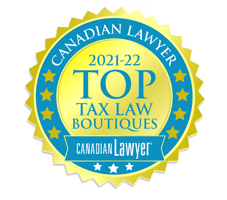
The Federal Court of Appeal has recently made it clear that the decision in Canada v. Sommerer
[2012] FCA 207 is correct and subsection 75(2) of the Income Tax Act does not apply to property sold for fair market value.
In March 2014, The Lawyers Weekly published
our article commenting on the Tax Court of Canada’s decision in Brent Kern Family Trust v. Canada [2013] T.C.J. No. 286. The BKT appealed the Tax Court’s decision to the Federal Court of Appeal. In October 2014, the FCA heard Brent Kern Family Trust v. Canada [2014] F.C.A. 230 and delivered judgment from the bench.
In the case, Kern wanted to withdraw the retained earnings of Wilf ’s Oilfield Services Ltd. (Opco) on a tax-free basis. In an attempt to achieve this laudable goal, Kern undertook a reorganization designed to distribute income from Opco’s retained earnings tax-free. He caused the incorporation of a holding company (Holdco) and two trusts. BKT was one of these trusts, and Opco was one of the BKT’s beneficiaries. Opco sold shares in Holdco to BKT for fair market value. Holdco issued dividends totalling $395,000 to BKT. BKT did not report the dividends based on BKT’s position that subsection 75(2) attributed the dividends to Opco and, therefore, BKT was not required to report the dividends. BKT distributed the dividends to its capital beneficiary, Kern, on a tax-free basis. Opco did not pay tax on the dividends that it was deemed to receive from Holdco pursuant to the tax-free intercorporate dividend rule in section 112 of the ITA. The Canada Revenue Agency reassessed BKT to include the $395,000 of dividends in BKT’s income.
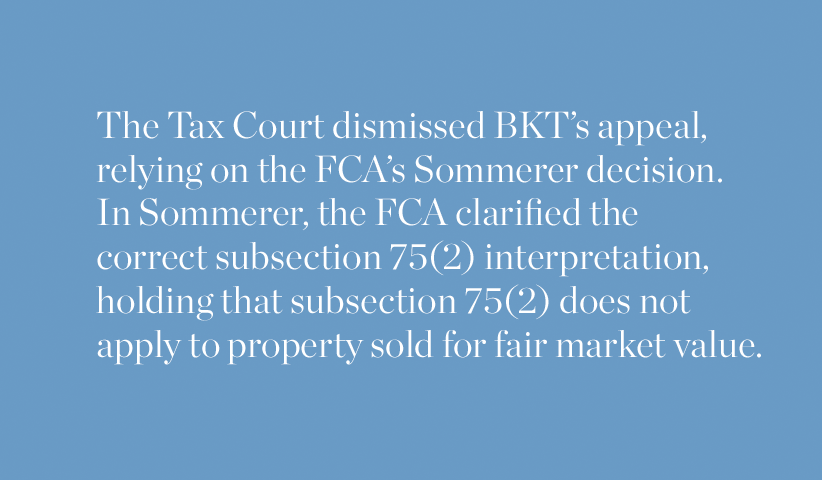
The Tax Court dismissed BKT’s appeal, relying on the FCA’s Sommerer decision. In Sommerer, the FCA clarified the correct subsection 75(2) interpretation, holding that subsection 75(2) does not apply to property sold for fair market value. In this regard, the facts in BKT were on all fours with Sommerer, i.e. BKT paid Opco fair market value to acquire the Holdco shares and, therefore, subsection 75(2) did not attribute the dividends to Opco. The Tax Court applied Sommerer to BKT and dismissed BKT’s appeal.
BKT appealed to the FCA on the basis Sommerer did not apply or, in the alternative, the FCA’s decision in Sommerer was manifestly wrong and the FCA should not follow the FCA’s previous decision. At the hearing of the appeal, BKT focussed on its alternative argument. In particular, BKT submitted that, in Sommerer, the FCA did not undertake a sufficient subsection 75(2) analysis. BKT submitted that the history of subsection 75(2) showed that the purpose is to prevent a taxpayer from reducing tax exposure when the taxpayer transfers property to a trust but retains the right to acquire the property again. BKT submitted that the consideration related to the property transferred to the trust is not relevant. BKT argued that, instead, the taxpayer’s right to claw back property ownership and the taxpayer’s ability to control the property are the only relevant considerations.
BKT’s alternative argument required that BKT establish that Sommerer was “manifestly wrong” on the basis that the FCA overlooked a relevant statutory provision on a case that ought to have been followed. However, BKT focused its oral argument on its subsection 75(2) interpretation with little, if any, argument to support that the analysis in Sommerer was deficient. Unsurprisingly, the FCA held that it would not overrule Sommerer because BKT failed to allege or identify any specific flaw capable of persuading the FCA that Sommerer was manifestly wrong.
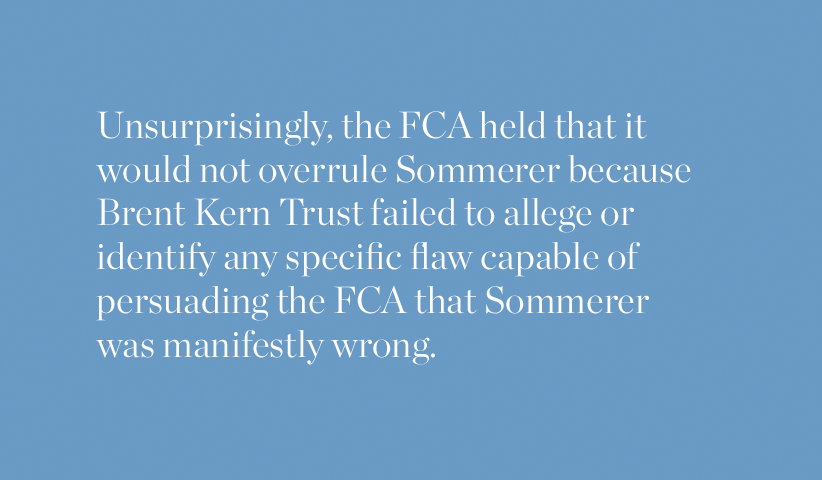
In these circumstances, the FCA did not address BKT’s subsection 75(2) analysis or comment on applicability of GAAR to BKT’s attempt to use subsection 75(2) to achieve a tax advantage. The FCA dismissed BKT’s appeal.
Surprisingly, BKT requested that the FCA grant leave, under Rule 357 of the Federal Court Rules, to allow BKT to appeal the decision the FCA just rendered from the Bench to the Supreme Court of Canada. Rule 357 is granted only in cases where the SCC should obviously hear the appeal and cases where there is significant disagreement within the FCA Panel as to whether the decision was correct. It did not appear that the FCA Panel in the present case was in any disagreement. BKT did not offer any bases to support the granting of leave. Unsurprisingly, the FCA dismissed BKT’s Rule 357 motion commenting that the SCC is capable of setting its own agenda. BKT’s Rule 357 motion did not form part of the FCA’s Reasons for Judgment. Despite the court’s view on Sommerer and subsection 75(2), it appears that BKT continues to believe that its appeal has merit. On December 10, 2014, BKT applied for leave to appeal to the SCC. We expect that the SCC will render its decision on the leave application in March 2015. In any event, we expect that, in due course, the Tax Court will consider whether the general anti-avoidance rule (GAAR) applies to cases where taxpayers have properly triggered subsection 75(2) in some other appeal.

.jpg?width=120&name=Counter%20Tax%20Litigators%20Logo%20Stacked%20(MidnightBlue%20on%20White).jpg)
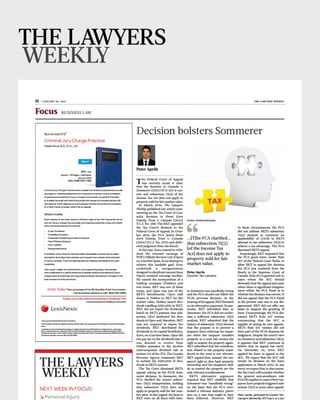












.png?width=400&height=400&name=CT-How_Can_We_Help-22_july_NewGraphic_b(small).png)

.png?width=1386&height=1224&name=2025%20Legal500%20Elite%20Boutique%20Award%20(Badge).png)
.png?width=1386&height=1224&name=ITR%20Finalist%20Practice%20Leader%20of%20Year%20Peter%20Aprile%202024%20(Badge).png)
.png?width=1386&height=1224&name=2025%20Legal500%20Leading%20Firm%20Client%20Satisfaction%20Award%20(Badge).png)
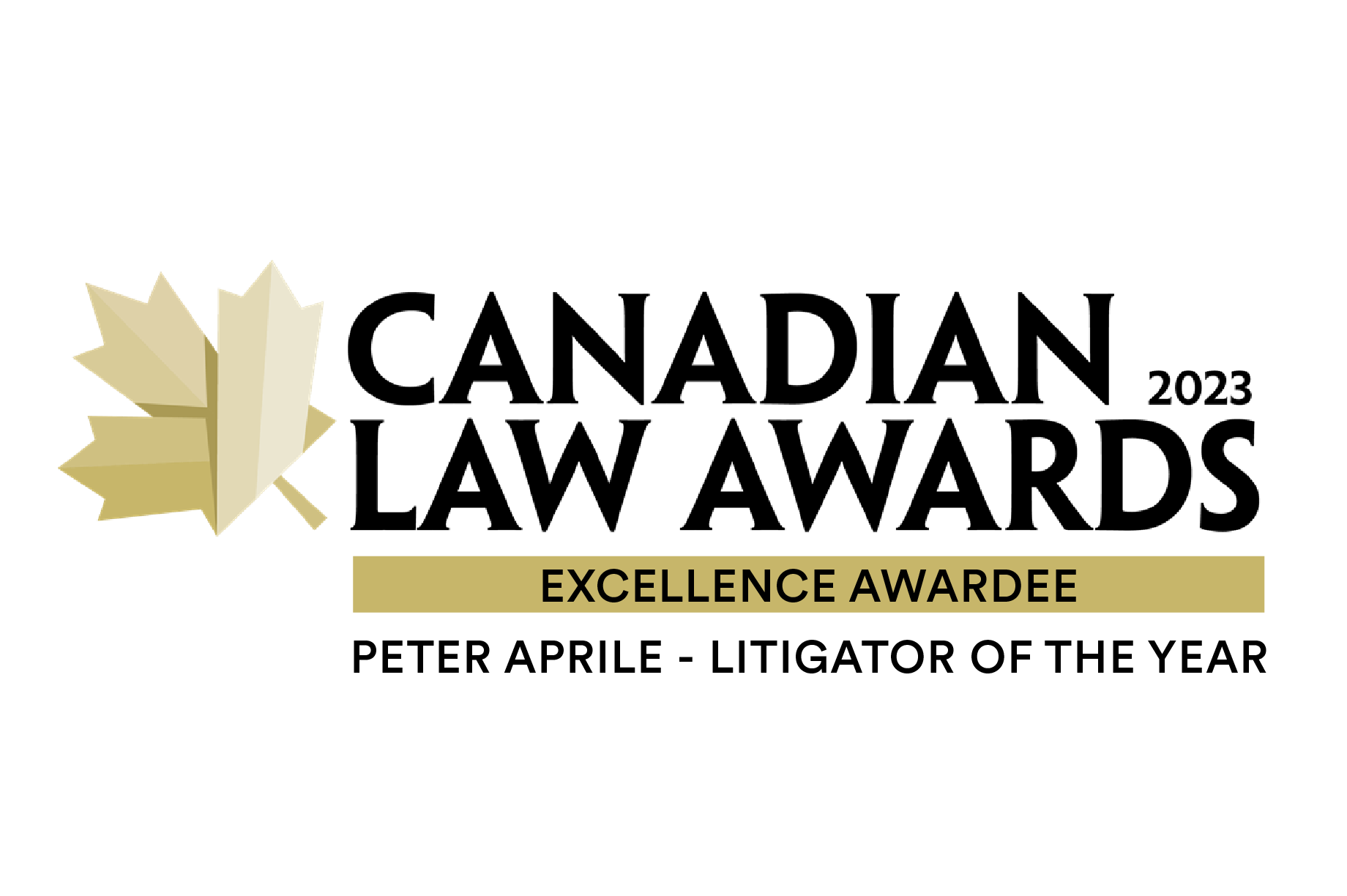


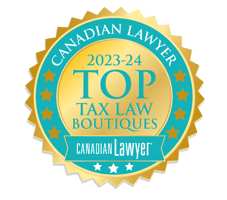

.png?width=1386&height=1224&name=ITR%20Tax%20Innovator%20Finalist%202024%20Award%20(Badge).png)
